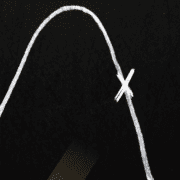Subjective Theory of Value
The question “what is value” must first be addressed outside the field of economics; it is one of the fundamental questions in the field of philosophy. It is the core of the branch of philosophy known as ethics. For millennia, philosophers debated the nature of value. One view was that value is intrinsic—given by a supernatural being, or given in the nature of things (a variant of this is that value is created by the labor that goes into making something). The other was that it was subjective—whatever any person wanted it to be.
Of course, these views are a false dichotomy. The flaw with the intrinsic view can be seen with the example of a drowning man, to whom water is not a value. The flaw with the subjective view can be seen with the example of the madman who tries to eat lead and drink petrol.
Ayn Rand defined value, in philosophy, as “that which one acts to gain or keep.” She noted that living things are fundamentally different from non-living things. They have an attribute that can go out of existence: their lives. Life requires of every living thing that it act to gain or keep values. Even a plant must grow its roots towards water, and its stem towards light.
And man is distinguished from all other animals in that he has a choice. Unlike animals, which act on instincts that are pre-programmed in, man has a choice. This choice extends to values. Values are not automatically given as a result of instincts, revelations, or any other process outside of consciousness. And man can make mistakes. And some values are “optional”: the preference for vanilla vs. chocolate ice cream, for example.
The proper approach to value in man, therefore, begins with recognizing value is determined by an act of consciousness. Man’s nature is to think and act based on his conclusions. But it is also necessary to recognize that value is not arbitrary. Value is not any whim that a drunk, stoned, or dysfunctional consciousness can dream up. There is a beat poem “Storm” (http://www.youtube.com/watch?v=HhGuXCuDb1U) which makes the point, among many others, that one is not free to walk out the second story window.
A value, therefore, is based on an act of consciousness and also on reality. One recognizes that something in existence will sustain or further one’s life.
One cannot ask the question “of value?” without first answering; to whom and for what.
This is where economics begins, after philosophy has done its job as described above. Carl Menger was the first to apply this approach to value—that it is the individual who is the unit valuer. It is meaningless to speak of nations, societies, or collectives. It is as meaningless to speak of value as being intrinsic to an inanimate thing. And it is as meaningless as speaking of value being arbitrary, capricious, spurious, or disconnected from reality, life, and reason.
This is what I think Menger meant by “subjective”: the individual is the proper subject of economics, not the class of the laborers or the nation of the British.
I think one will find with this concept clearly defined that it does not change the meaning of Menger’s ideas, nor economic analysis. But it will help explain numerous phenomena, for example that marginal utility declines.
Why is this so? Why does everyone value the 11th unit of wheat less than the 1st unit? It is because they value wheat for eating. But one’s need to eat is finite and once it is satisfied, one moves on to satisfy other needs.
I think this issue is important because Austrian School economics is about free markets and freedom generally. The statists have a very different (and dishonest) view of economics. There is a philosophy that leads to and proves that free markets and freedom is not only the way to prosperity but also the only moral kind of system. I plan to write more about this connection between gold, liberty, and philosophy in future pieces.







Trackbacks & Pingbacks
[…] Publicado originalmente em Monetary Metals. […]
Comments are closed.